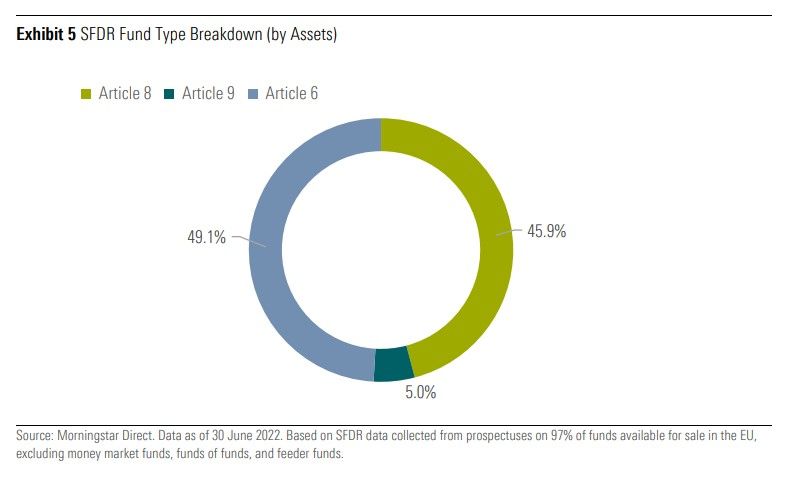Investors pulled €30bn from Article 8 funds in Q2, but poured almost €6bn into ‘greener’ Article 9 mandates against a backdrop of inflation, conflict and fears of a global recession, Morningstar data has revealed.
In a second-quarter review of Article 8 and 9 funds, as classified by the EU’s Sustainable Finance Disclosure Regulation (SFDR), Morningstar looked at flows, assets and products in this segment of the market.
Under SFDR, which came into force in March 2021, funds for sale in the EU are classified as either Article 6, 8 or 9 depending on their level of sustainability. Article 6 funds do not have a sustainability scope, Article 8 funds are ‘light green’, promoting environmental and social factors, while Article 9 funds are ‘dark green’, placing ESG factors at the heart of their objectives.
Morningstar found Article 8 and 9 funds together accounted for just over 50% market share of the EU fund universe in the second quarter, but saw their assets decline by 6.4% at the end of June. Product development remained stable, with 183 new fund launches during the second quarter, while more than 700 products recategorised their SFDR status, with most being upgraded from Article 6 to 8.

Climate funds lead product rollouts
Climate funds were a popular theme among new launches, with newcomers including Nordea Global Climate Engagement, Pictet Climate Government Bond and BNP Paribas Emerging Climate Solutions. Active ownership and engagement to push companies to do better on ESG was another key theme, reflected in new funds such as DWS Invest ESG Mobility.
The Article 9 leaderboard in terms of flows was well-staffed with passive climate-flavoured funds, Morningstar said, with eight of the top 10 funds tracking Paris-aligned or climate transition benchmarks. The top for inflows was the iShares MSCI USA ESG Enhanced ETF.
The top asset-gatherer in Q2 among the Article 8 funds was the Aviva Investors Global Sovereign Bond Fund.
ESG credentials under scrutiny
Morningstar also looked at the ESG credentials of ‘light green’ versus ‘dark green’ funds, considering their ESG risk and exposure to controversial activities such as fossil fuels and nuclear power. As expected it found Article 8 and 9 funds are less exposed to weapons and tobacco than Article 6 funds, but Morningstar noted there was still some exposure to fossil fuels and nuclear even in the ‘dark green’ funds, which may “come as a surprise to some investors”.
“Only a minority of Article 8 funds (22%) and Article 9 funds (24%) have no fossil fuel involvement,” it said. This is because funds are investing in so-called transitioning companies, such as oil and gas and utility companies that have pledged to move away from carbon-intensive activities towards net-zero emissions.”
The top stocks held across Article 8 funds in Q2 included Alphabet, Microsoft, ASML, Roche and Novo Nordisk. Amazon features in the top 20 stocks despite carrying a High ESG Risk score, Morningstar noted. Across Article 9 funds, Schneider Electric, Vestas Wind Systems and Koninklijke DSM featured among the most popular stocks.
Advisers will struggle to comply with MiFID II
Meanwhile, the new Mifid II requirements that come into force today, making it mandatory for advisers to ask investors about their sustainability preferences, will be a challenge, according to Morningstar. For those clients interested in investing sustainably, advisers will now have to source products that have a minimum proportion of sustainable investments, as defined by the SFDR or EU Taxonomy.
To make the product selection process easier for advisers, asset managers have begun to disclose information through a new European ESG template (EET), and it is this data that Morningstar has reviewed. It noted that different interpretations of SFDR and the EU Taxonomy have led asset managers to adopt different approaches, making direct comparison impossible.
“Different interpretations of the SFDR and the EU Taxonomy have led asset managers to adopt different approaches to the calculation of sustainable investment exposure and taxonomy alignment, rendering it impossible to compare products directly,” said Hortense Bioy, global director of sustainable research at Morningstar and ESG Clarity Committee member.
“Because of patchy data and a lack of direct comparability between products, financial advisers will struggle to fulfil their new obligations.”








